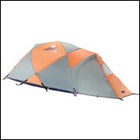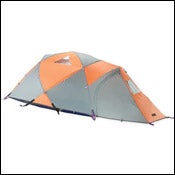Technology has done wondrous things in the outdoor-gear world in recent years, but one nut remains fairly tough to crack: a lightweight four-season tent. The reasons for that are varied. Tents that can stand up to wind, heavy snow-loads, and cold temperatures need more poles and material than their summer-friendly tent kin. Add-ons such as pole-supported vestibules are exceedingly useful things if youre snow-bound for even a day or two, but those add weight as well. And sometimes four-season tents are simply a little larger to accommodate fat cold-weather sleeping bags and all the extra gear snow campers tend to drag into the tent.
Mountain Hardwear Trango 2 tent
 Trango 2 tent
Trango 2 tentWhat you usually end up with is a tent such as the Mountain Hardwear Trango 2 ($450; www.mountainhardwear.com). Its an excellent tent, with a spacious interior, rugged design, fully waterproof bathtub floor, pole-supported vestibule, and more. Youll be very happy sitting out a snowstorm in a Trango 2. You might be less happy, however, carrying all ten pounds of it.
Marmots Thor ($469; www.marmot.com) is a little leanerjust over eight poundsand has similar features such as the pole-supported vestibule. Its a little smaller, with 38 square feet as opposed to the Trangos 41. But thats still a pretty roomy two-person tent. Lots of summer tents have around 30 square feet and claim space for two.
Other options? You could go radical, for instance. The Black Diamond Lighthouse ($369; www.bdel.com), uses a single-wall, nearly waterproof design that employs Epic Nextec fabric. Itll easily shed snow and is tough enough to take big wind and snow loads. And (drum roll) it weighs around three pounds. But life is full of tradeoffs. For one, single-wall tents are inherently colder than double-walls such as the Trango or Thor because they lack that air space between the fly and canopy. Two, the Lighthouse has no vestibule, unless you buy the optional one from Black Diamond. But thats another $139, plus it adds another pound-plus. Or, try the MSR Twin Peaks ($189; www.msrcorp.com). Its actually only half a tent, sort of a pole-supported tarp. You dig out a below-grade shelter for your sleeping bags, pitch the Twin Peaks over that, then pile snow along the base of the tent. An almost instant igloo. And it weighs less than two pounds.
On the bargain front, REI Mountain 2 holds two people, stands up to lousy weather, weighs a not-unreasonable nine pounds, and costs only $269.
Lastly, you can try a tent that eschews American design, such as the Hilleberg Jannu ($595; www.hilleberg.com). Its a true all-season tent that uses some innovative design tricks (such as a canopy and fly that are pre-connected for faster setup) and super-light materials to yield a strong tent that sleeps two and weighs about six pounds, three ounces. The one tradeoff here, besides the fairly harsh price, is that the Jannus vestibule is staked out, not pole-supported. That may or may not make a difference, as it largely precludes using the vestibule for a cooking space during long periods of bad weather. But its an excellent tent.
Get more advice from the Gear Guy as he picks this seasons top gifts in Youll probably find a few things to put on your own wish list, too.


